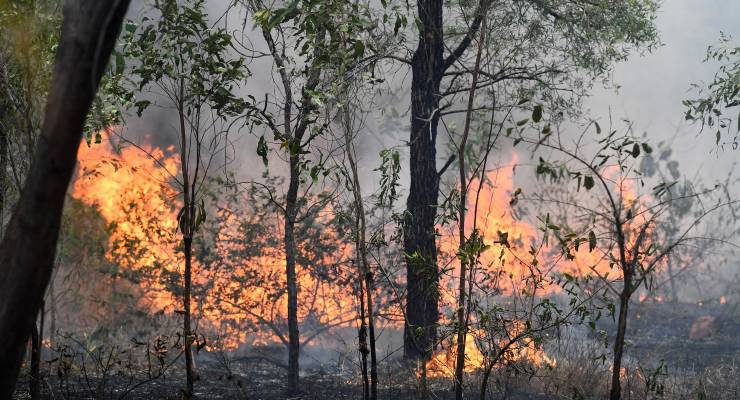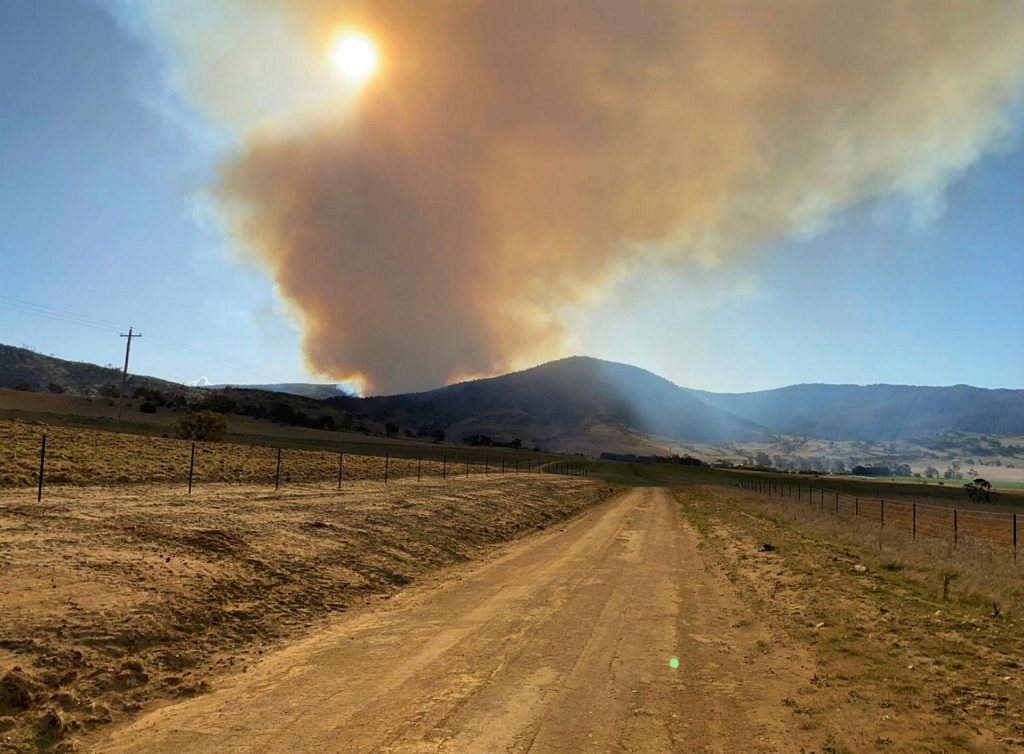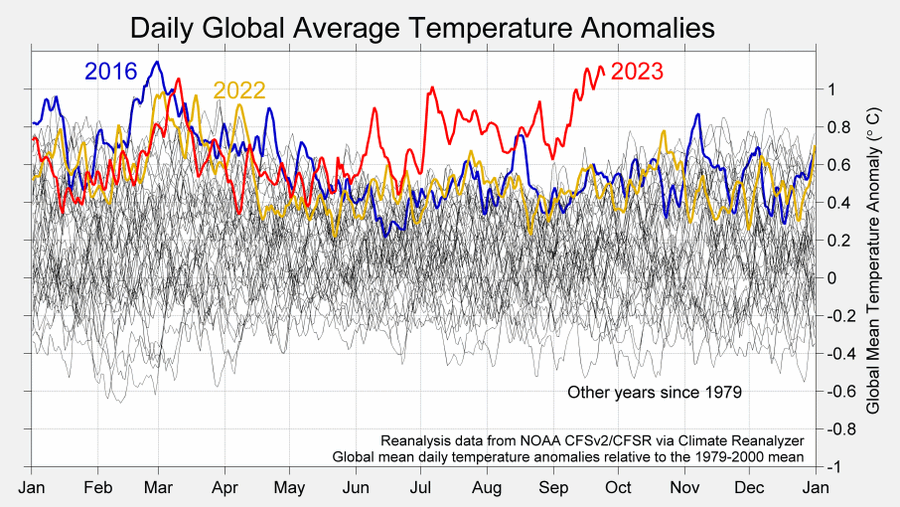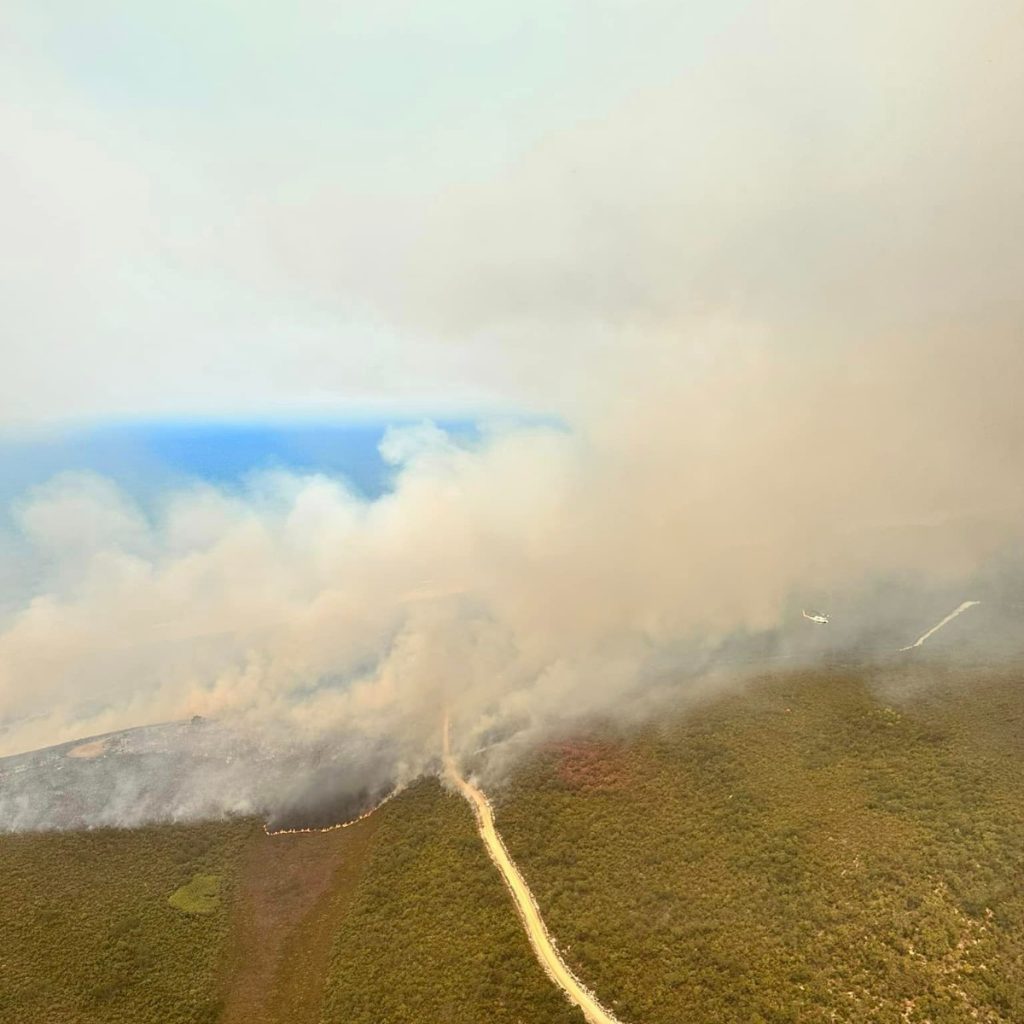
“We really should be on a war footing, because this [climate emergency] is going to act like a war … A whole generation of people is waking up to the fact that we have destroyed their future,” said John Gummer Lord Deben in Canada’s British Columbia.
In three Hill Times op-eds early in the summer, I postulated that Canadians and policymakers were deep in society-wide implicatory denial on climate change, but that the building El Niño could force a seismic awakening. Implicatory denial is when you don’t deny that climate change is real or is happening, and you don’t deny the science, but you don’t act reasonably or responsibly. You don’t act on what you know.
The extreme weather this year in what’s only the beginning phase of the El Niño has caused a ripple of concern, but denial remains strong. Now, moving into winter in the northern hemisphere, the climate news focus will shift south and especially to Australia where we will see just how powerful the El Niño will be in full bloom.

Australia mirrors Canada as it’s big and vulnerable, and is also a major global producer of fossil fuels. Will climate change be a wake-up call for Aussies who also share our society-wide denial about what we should responsibly do about this most dangerous of problems?
It’s been the warmest winter ever in Australia with record-breaking high temperatures this spring. Australia is vulnerable to El Niño-Southern Oscillation whip-sawing of climate anomalies, as well the Indian Ocean Dipole. Extreme weather has increased. Certainly the building El Niño will bring drought and heat waves, and further endanger the Great Barrier Reef. The wildfires in 2020 shook the nation, and the past several years have been wetter in the fading La Niña which has made fire prediction for this summer more difficult.
But will people be pushed out of denial by extreme weather? Australia, like Canada, is a wealthy, technologically powerful nation, and major loss of life shouldn’t be expected. But will the pain caused during this El Niño force Aussies to connect the dots between their production and export of coal and gas, and climate change events and damage at home?

The wake-up call I envision is an angry public now aware of the growing climate dangers, waking up to their culpability as a major fossil-fuel producer and the feebleness of the Aussie Labor government’s pretend mitigation. “If the climate is getting this bad — looks to be getting much worse, and we are already near if not over the tipping points to escalating feedbacks — why are we still allowing, even supporting, continuing fossil fuel production?” they might ask themselves.
Due to the El Niño, Canada should have a somewhat warmer winter, but with the climate anomalies we are coming to expect: a weakened jet stream to allow warm systems to wander deep into the Arctic, and chilly polar vortexes to escape the Arctic and pulverise southern Canada.
El Niños normally last around 12 months; right now, those predicting expect it to still be a weather factor next summer in the northern hemisphere. We should be expecting more forest fires and floods, more heat domes and drought, but probably less intense extreme weather than this past summer.
But will the extreme climate events awaken Canadians to how pretend our mitigation efforts have been? To how irresponsible and criminal is our continuing expansion of fossil fuel production and use?
Probably not, because denial is strong. We greatly benefit from both fossil-fuel production for export and our own domestic use. And our socio-economy is presently felt to be too fragile to even consider the deep systemic change now needed.
An awakening probably will not happen; not through direct damage in Canada, at least not this summer. Forest fires, more worrying heat domes and flooding, possibly increased damage to crops — but not millions dying as could happen next summer in the Middle East or in the Indian subcontinent. But global temperatures, especially the off-the-chart ocean temperatures, even with a fading El Niño, could bring severe damage in more vulnerable parts of the northern hemisphere next summer with unprecedented mortality that could change priorities globally.
More likely would be a scenario where, for example, large chunks of the southern United States will endure a second summer of heat and extreme weather that causes serious disruption to the economy and ordinary people’s lives so that they consider mass migration, like in the dust bowl of the “dirty ’30s”. It probably won’t happen this El Niño, but last summer’s extreme weather was serious enough that if next summer is similar, Americans (and Canadians) might begin to openly question the lack of effective mitigation: “How could we still be allowing increased production of fossil fuels while we are witness to large parts of our country becoming uninhabitable?”

Australians, Canadians and Americans might start asking some difficult questions: why are our governments allowing this building catastrophe to happen? Isn’t it clear that our governments’ mitigation policies have been ineffectual for at least three decades for short-term, self-interest, myopic, economic and political reasons? Why are we not even considering mitigation policies that are essential to bringing emissions down and protecting our countries from growing existential dangers? Given so much is at stake, why do we have ineffectual, pretend mitigation?
Possibly, then, the wake-up call will go society-wide, and implicatory denial will become as untenable as the old flat-earth, “it’s a hoax” climate denial. Wouldn’t want to be in government. No net zero by 2050 kicking the can down the road.
Watch what happens in Australia this summer, and then what happens in the northern hemisphere next year.
Large chunks of the American south becoming uninhabitable is unlikely to happen this El Niño, but will people start to wake up to the possibility that this will happen some time soon without real emission reduction, nationally and globally right now? And that the energy transition conception of mitigation is not going to reduce emissions nearly enough right now when a 7% to 10% reduction a year is an imperative? And that the major global fossil-fuel producers agreeing to wind down production in a fossil fuel non-proliferation treaty is essential?
Watch what happens to the public awareness of climate dangers and possible effective mitigation in large producer countries throughout this building El Niño. Will denial fade and effective mitigation become possible?
This article was republished with permission from The Hill Times.
What can we do to prepare for an El Niño summer? Let us know your thoughts by writing to letters@crikey.com.au. Please include your full name to be considered for publication. We reserve the right to edit for length and clarity.








Our governments are owned by people who profit from the things that cause global warming. Those people think they can avoid the suffering caused by global warming and dont care about what it means for the rest of us. So dont expect anything to change no matter how bad it gets. It will be up to the public to seriously kick arse before the elected decision makers do anything responsible.
if you plan on protest the fossil fuel industry also control the police so a jail term of 20 years is possible. Protest is now very scary and the full weight of state power will descend on you. The idea is the keep you ill informed and impotent
MSM often use language that implies that when we stop burning fossil fuels the climate will return to normal pretty soon. In other words, all we have to do is stop producing CO2 and everything will be fine. Misplaced optimism, but human nature.
no, but at least further warming will stop almost immediately
Unfortunately we’re locked into a downward existential spiral – by government’s mesmerized by present day fiscal imperatives and the electoral cycle…. and much of an electorate looking at the same things.
Too true klewso, our brains have formed to be local and very temporal, but given the existential dangers and the imperative timeline for action , those responsible have to act
Look at the mile-stones/indicators on this downward path.
The number of species ‘we’ are chewing through – to make room to produce more : when we should be living within our planet/environment’s means, and making do with less – as there are more to share?
The species and environment razed to raise cattle, soy beans, palm oil, to mine gold, gems, and timber – for those that can afford them.
All under the altruistic ostensible excuse of ‘progress’ for the less well-off – when those expendable ‘workers’ work for shekels – who really profits beyond avaricious crook politicians and their ‘sponsor’ cronies? Gaming the system to their ends.
Not until it slaps suburbia in the face; too hot for children’s sport and the surf club underwater.
The big emitters could be recast as providers of non-fossil energy. This could be achieved with a government policy laying out a schedule that takes each of them to 100% non-fossil energy by a certain date. Enabling them to supply clean electricity on demand requires lifting the fatwa against nuclear. However our own society is riddled with ignorant bigots who would rather commit our grandchildren to fry in hell than let them utter the N-word.
Roger, Nuclear is the equivalent of early aviation of Hydrogen. That too, looked promising in its early years. But circumstances and developments were against its long term success, thus use.
Fifty years ago, solar, wind and energy storage were hot topics. The science was established, the technology was emerging and the people were willing. Funding appeared, including from fossil industries, and wind and solar began to expand. However energy storage R and D went unfunded. The technology was not the problem, indeed the FT synthesis of fuel had helped the Luftwaffe. It was rather that the fossil industries did not and do not want to be replaced. You can see this essential treachery in the small print of every “100% renewables” plan for powering the country – it is a line to the effect of “plus a tiny bit of gas”. But it is not a tiny trickle of gas all the time, it is that some of the time, our electricity must be supplied by the full scale fossil driven power supply running at full blast. The bean counters will ensure that it won’t remain “tiny”. Every time rent-a-crowd blocks nuclear, we collapse back into the grip of our fossil masters.
Please reference one of the plans that does this.
Provide a reference? Fair request. What I had in mind is tables, in various papers, of the energy mix required to satisfy net zero. I am travelling at the moment, but can point to the following –
tandfonline.com/doi/full/10.1080/14693062.2022.2061407?src=recsys
This paper perpetuates the lie that a little bit of emissions can be made without exceeding 1.5°. The authors go so far as to say that half of today’s emissions are tolerable without increasing warming. This equates to saying that some emissions are tolerable for most of the time.
(“To keep global heating below 1.5°C without overshoot by 2050, global CO2 emissions must decline by about half by 2030.”)
dcceew.gov.au/sites/default/files/documents/australias-emissions-projections-2022.pdf
Here the government implies that some gas may be necessary to reach net zero –
(“The role of gas, type of gas, and its use in the residential, commercial, and industrial sectors is
uncertain as Australia transitions to net zero emissions by 2050. “)
When authors describe the backup that fills the gap of capability of when the wind don’t blow in the sun don’t shine, they often codify the use of mineral gas by referring to biogas. Since biogas is inherently incapable of supplying all of Australia’s energy, even for a little bit of the time, they are implying that we will need mineral gas. Since this is not politically correct to admit, mineral gas is implied in the term “biogas”. It is written baldly, but we can infer that mineral gas is implied in the fine print.
arena.gov.au/assets/2017/06/Elliston_2014_5.pdf
Arena proposed RE100 as extensive renewables with shortfalls being made up with biogas. Since biogas will always be in short supply, the backstop use of mineral gas is implied – in the fine print. (” and OCGTs fuelled with gasified bioenergy, typically from crop residues.”)
sciencedirect.com/science/article/abs/pii/S0301421513002164 bar
(“and gas turbines (GTs) fired with biofuels.”)
I am sorry to be so long-winded, however I am travelling and cannot readily point to a more succinct example.This
Right. So your source is “I said so”.